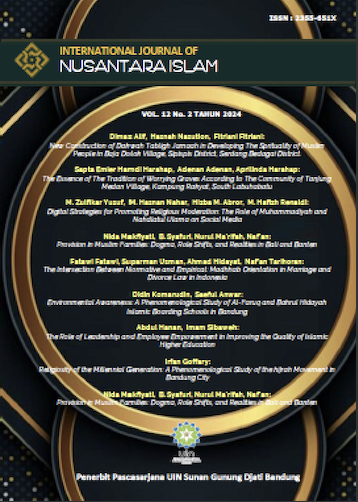The Intersection Between Normative and Empirical: Madhhab Orientation in Marriage and Divorce Law in Indonesia
Main Article Content
Abstract
The codification of Islamic law (taqnīn) is crucial in providing legal certainty in marriage and divorce in Indonesia while maintaining the relevance of sharī’ah values amidst social changes. This study aims to examine the implementation of Law No. 1 of 1974 on Marriage and the Compilation of Islamic Law (KHI) in the context of madhhab pluralism. The research employs a qualitative descriptive method with normative and empirical analysis approaches. The findings reveal that the codification of Islamic law faces challenges in accommodating diverse fiqh perspectives, ensuring gender justice, and addressing the administrative needs of society. The maqāṣid al-sharī‘ah approach is an essential foundation for an inclusive transformation of Islamic law, particularly in aligning classical fiqh values with modern legal norms. This study recommends harmonizing Islamic law principles with the national legal system to create just, relevant, and beneficial regulations for Indonesian society
Article Details
The Authors submitting a manuscript do so on the understanding that if accepted for publication, copyright of the article shall be assigned to International Journal of Nusantara Islam, Sunan Gunung Djati State Islamic University.
The copyright encompasses exclusive rights to reproduce and disseminate articles in all forms and media, including reprints, photographs, microfilm, and similar reproductions, as well as translations. Some or all of the contents of this journal can be stored in databases and transmitted in any form and media without the need for written permission from the International Journal of Nusantara Islam, Sunan Gunung Djati State Islamic University.
The Editors and the Advisory International Editorial Board make every effort to ensure that no wrong or misleading data, opinions or statements be published in the journal. In any way, the contents of the articles and advertisements published in the International Journal of Nusantara Islam (IJNI) are sole and exclusive responsibility of their respective authors and advertisers.

